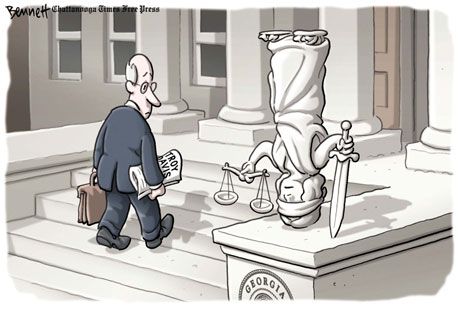“Punting the Pundits” is an Open Thread. It is a selection of editorials and opinions from around the news medium and the internet blogs. The intent is to provide a forum for your reactions and opinions, not just to the opinions presented, but to what ever you find important.
Thanks to ek hornbeck, click on the link and you can access all the past “Punting the Pundits”.
 Eugene Robinson: ‘Probably’ Isn’t Good Enough
Eugene Robinson: ‘Probably’ Isn’t Good Enough
The death penalty is a barbaric anachronism, a crude instrument not of justice but of revenge. Most countries banished it long ago. This country should banish it now.
The state of Georgia was wrong to execute convicted murderer Troy Anthony Davis as protesters and journalists kept a ghoulish vigil Wednesday night-just as the state of Texas was wrong, hours earlier, to execute racist killer Lawrence Russell Brewer.
Paul Krugman: The Social Contract
This week President Obama said the obvious: that wealthy Americans, many of whom pay remarkably little in taxes, should bear part of the cost of reducing the long-run budget deficit. And Republicans like Representative Paul Ryan responded with shrieks of “class warfare.”
It was, of course, nothing of the sort. On the contrary, it’s people like Mr. Ryan, who want to exempt the very rich from bearing any of the burden of making our finances sustainable, who are waging class war.
I don’t know if Troy Davis was innocent, but I do know that the evidence for demanding a re-examination of his conviction, including the recanted testimony of most of the witnesses against him, was overwhelming. But of course that is now beside the point, which is exactly what is so wrong about the use of the death penalty. No matter what evidence of innocence might be produced in the future, it is of consequence no longer.
That is a compelling argument against the death penalty-no room for correction-but there are others. The most egregious argument for capital punishment is the claim that the finality of officially condoned killing is a necessary guarantor of civilized order. Egregious because it is not possible to make that case without explaining why most of the democratic societies that we admire shun the death penalty as contrary to their most deeply held values.
David Sirota: Two Heads of One Political Monster
By now, probably everyone reading this is already sick of America’s quadrennial political spectacle-the one in which politicians and media outlets ask us to believe that there remain vast differences between our two political parties. It’s like cheaply staged pornography on a red and blue set, with words like “polarization,” “socialist,” and “extremist” comprising the breathless dialogue in a wholly unconvincing plot.
Some of this tripe can be momentarily compelling, of course. And as the 2012 election climax draws nearer, many Americans will no doubt submit to the fantasy. But before that happens, it’s worth looking a few levels beneath the orgiastic presidential campaign for a last necessary dose of nonfiction, if only to remind us that the parties are often two heads of the same political monster.
John Nichols: GOP Debaters Needn’t Worry: Obama’s No Socialist
Asked whether Barack Obama was a socialist — as Texas Governor Rick Perry, Minnesota Congresswoman Michele Bachmann and former House Speaker Newt Gingrich have all agreed is most certainly — former Massachusetts Governor Mitt Romney tried to talk his way around the most predictable question of Thursday night’s Fox News/Google debate.
But he more or less “went there.”
“What President Obama is, is a big-spending liberal,” Romney replied. “He takes his political inspiration from Europe and from the socialist democrats in Europe. Guess what? Europe isn’t working in Europe. It’s not going to work here.”
A few minutes later, Gingrich went all in, decrying “Obama’s socialist policies.”
So there you have it. Obama’s a socialist, right? Wrong.
E. J. Dionne, Jr.: When Socialism Saves Capitalism
Washington – Have you noticed that one of the Obama administration’s most successful programs is also its most “socialist” initiative?
OK, the bailout of General Motors and Chrysler was not socialist in the classic sense: the government was not looking to hold onto the companies over the long run. Their turnaround was accomplished in significant part by tough, capitalist management steps.
But, yes, this was socialism — or, perhaps, “state capitalism” — because the government temporarily took substantial ownership in the companies when no one in the private sector was willing to put up enough capital to prevent them from going under. Today, the companies are thriving.
More than that: the auto industry exemplifies how unions can do their best to protect the interests of their members while also ensuring the prosperity of the companies that employ them.

Recent Comments